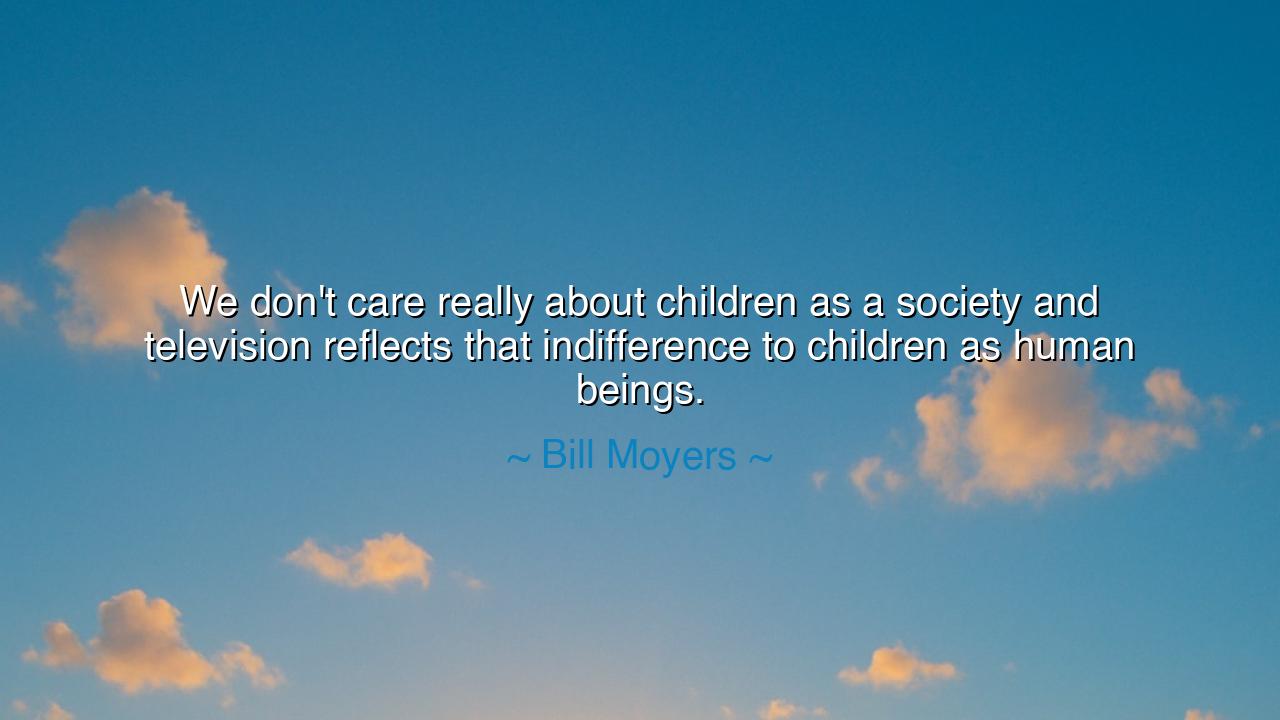
We don't care really about children as a society and television
We don't care really about children as a society and television reflects that indifference to children as human beings.






In the halls of time, where the echoes of humanity’s past reverberate through the ages, one truth stands unshaken: the future of any society lies in the hands of its children. Yet, in the words of Bill Moyers, we hear a lamentation that cuts deep into the heart of modern civilization: “We don't care really about children as a society, and television reflects that indifference to children as human beings.” This declaration, powerful and unflinching, speaks of a grievous neglect—a silent erosion of what should be sacred: the nurturing of the young. The children, the inheritors of all our dreams, should be the focus of our care and attention, but how often are they overlooked in the pursuit of other, more fleeting desires?
Television, that all-pervasive force that has claimed the hearts and minds of so many, mirrors the society it reflects. Through its glowing screen, the world of children is often depicted as trivial, humorous, or even corrupt—rarely as something worthy of our true investment. And yet, what is more sacred than the lives of the young, those who are the seeds of tomorrow's triumphs and tragedies? We, as a people, must ask ourselves: How have we come to this point? How have we allowed the very means of shaping minds, of influencing futures, to become a tool of distraction and desensitization? The story of the present age is that of a society that has turned its gaze away from its most vulnerable, distracted by the glittering distractions of the modern world.
Let us turn our gaze to the ancient Greeks, who revered children not merely as the future, but as a vital part of the present. In their philosophies, there was no higher calling than the cultivation of the young—through education, mentorship, and care. They understood that the strength of a society was not in its wealth or power, but in the wisdom and compassion it invested in its children. There are stories from their myths, like that of Prometheus, who defied the gods to give fire to humankind—symbolizing the passing of knowledge and care to the next generation. What have we done with the fire of knowledge in our own time? Have we tended it carefully, or have we let it die out, turning instead to the shallow warmth of entertainment?
Moyers’ words hold a mirror up to our own age, where children, once cherished as symbols of hope, are instead used as pawns in a game of consumption. The great prophets of history, from Mahatma Gandhi to Nelson Mandela, spoke of the dignity of all people, especially the vulnerable. Yet in modern times, the dignity of children is often cheapened. The toys they play with, the shows they watch, the images they consume—each one a reflection of a society that no longer sees the child as a sacred being, but as a market to be sold, a mind to be shaped into conformity.
Consider the stories of the past, where the foundations of a great empire rested not on military conquest or greed, but on the nurturing of minds. The Romans, for instance, understood the importance of education and societal values. Cicero wrote passionately about the role of parents and teachers in shaping young minds, and the greatness of Rome was born not only from its legions but from its ability to mold its youth into responsible and wise citizens. In such a world, the treatment of children was a matter of great honor—and their welfare was woven into the very fabric of the nation’s future. What have we become, when we cannot even afford such care for the generation that follows?
The lesson here, dear reader, is not one of despair, but of awakening. It is time for us to recognize the truth in Moyers’ words, to see the deep indifference that has crept into our society, and to choose another path. The future of our world lies in the hearts and minds of the young, and they cannot thrive in a world that shuns them. It is not enough to offer them the mere crumbs of entertainment. No, we must offer them the full feast of knowledge, wisdom, and love. The responsibility lies with each of us—whether as parents, teachers, mentors, or members of the broader community—to step forward and reclaim the care of the child.
To do this, we must start by valuing children as they deserve. We must raise our voices in opposition to the forces that seek to exploit and manipulate them. Television, while a powerful tool, must not be a source of harm; it must be a vehicle for growth, wisdom, and joy. Let us invest in the education and well-being of our youth, and in doing so, we will reclaim the soul of our society. For only when we show our children that they are valued—not as consumers, but as human beings—will we heal the wounds of a world that has forgotten what is truly sacred.
So, let this be our call to action: Invest in the future, for the future lies in the hearts of the children. Let us turn our attention away from the distractions that lead us astray, and focus on what truly matters. Care for the child, for in doing so, we care for all of humanity.






AAdministratorAdministrator
Welcome, honored guests. Please leave a comment, we will respond soon